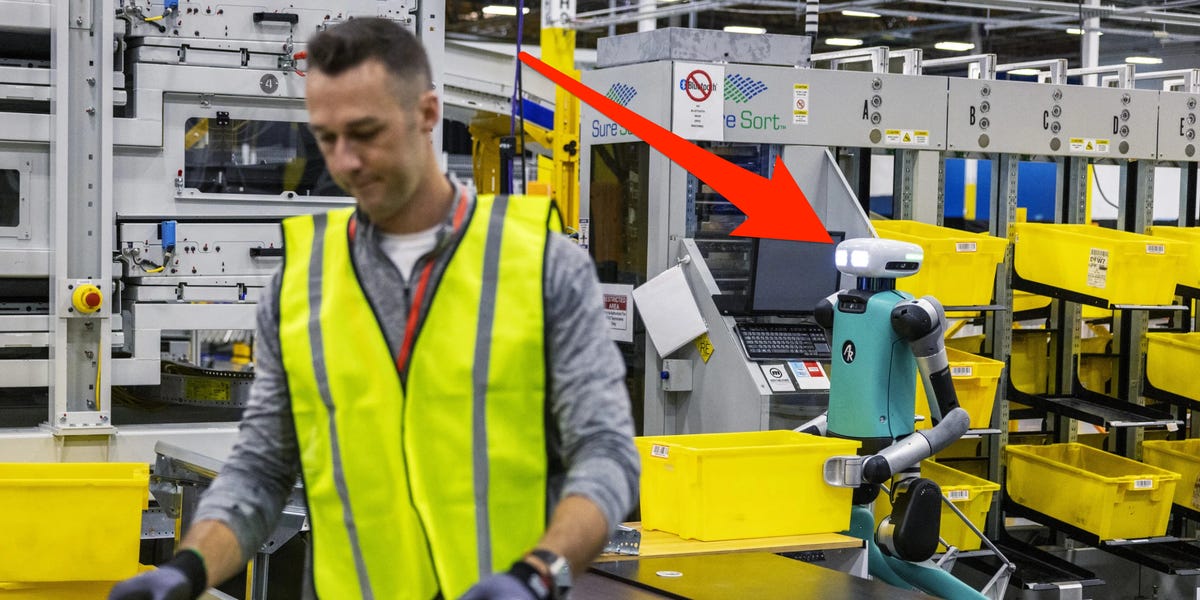Amazon’s humanoid warehouse robots will eventually cost only $3 per hour to operate. That won’t calm workers’ fears of being replaced.::The robot’s human-like shape is bound to reignite workers’ fears of being replaced, but Amazon says they’re designed to “work collaboratively.”
People bitch about working conditions and the actual work in these warehouses yet don’t want to be replaced by a robot who doesn’t care about any of that? Yeah, no. I’m all for robots doing this kind of soul sucking work.
No one is complaining about working conditions for the sake of it. There’s literally nowhere else to go for them. You are not helping anyone but the rich fucks by having them replaced by robots.
BS. I live in a town with an Amazon warehouse. There’s PLENTY of places for them to go. Hell, I’m hiring.
In isolation the automation of roles is a great thing, but the way society is currently run your entire quality of existence is tied to your job, and retraining and getting a new job is harder than ever and costs a lot.
If society made it easier for people to retrain and get better jobs and slowly replaced all those bad jobs with an automated workforce it would be better for everyone.
Can’t see it happening though…
I think it’s still possible for EU to regulate this and protect workers here. Not in US though.
Maybe but I don’t know how they can realistically do anything worthwhile. As forcing companies to keep staff on and not automate isn’t a good outcome and isn’t fixing the societal issues that make this a problematic scenario.
If a robot/ai/machine can do a job safer, more efficiently, quicker than a person, it should 1000000% be automated by the given thing. This has been happening for hundreds of years in all industries.
I expect eventually both countries will be forced into a income tax based UBI. It sounds weird but it’s that or the jobless riot, and even if they didn’t, if there’s no cash to spend, a company can’t continue to operate.
Well, I guess EU would simply come up with a plan for the automation that will not leave people without any protection. No idea what it would look like but they could for example come up with some legal definition of AI worker, establish mandatory staffing levels (for example 50% of employees must be human until 2040), tax ‘salaries’ of AI workers and use this revenue to retrain the workforce. We would still end up with automated jobs but it would happen in an organize manner.
I’m sure we’ll get there eventually, but robots still suck at doing stuff like this. Maybe when they marry robots up with AI, we’ll have robots that can figure out what to do when there’s the slightest deviation to the operating conditions, like a piece of trash shows up on the line, or they get twisted 30 degrees off from their station, or a part of the line gets moved 2 inches. For now though, robots are only great at following pre-programmed instructions EXACTLY the same way every time. Even then, they still manage to fuck that up some of the time. I worked with welding robots for years that only had one task and one task only, to apply welds to car seat parts, and they fucked up on us all the time, on a daily basis. The technology will get there one day, but I doubt we’re there.
I work with a system of distribution robots and can attest to everything you’ve just said. The only caveat I’d add is that “some day” may be sooner than you think. Moore’s law is a helluva force.
Considering how each generation of Boston Dynamics robots becomes more and more graceful, I don’t see how the problems you suggested won’t be non-issues incredibly fast.
Also, unrelated to your comment, people are delusional if they don’t think this is the ultimate goal, right? Amazon’s reassurances are bunk - if they could eliminate people they would, they just can’t do without them yet.
Boston Dynamic’s robots are works of art - the pinnacle of engineering - but its all designed movement. By this I mean the control systems, their movement plans - it is built and designed by experts in their field. It’s not quite as simple as “go from A to B and do some parkour on the way”. There’s a very large gap between “what is mechanically possible to do” and “Just let the robot figure out how to do that”.
Mechanically we’re ahead of software for manipulation and kinodynamic planning.
Yep.
Just look at automotive manufacture robots. Saw my first one about 1980. Mind blowing at the time. That was a trivially simple one compared to what you see today.
Then saw a robot doing backup tape changes for a very large organization about 1995. The racks held thousands of tapes, they had adapted an automotive manufacture robot to the task. It was in place and running for a couple years when I saw it… Nearly 30 years ago now. Damn thing was fast.
I’m actually working on this problem right now for my master’s capstone project. I’m almost done with it; I can have it generating a series of steps to try and fetch me something based on simple objectives like “I’m thirsty”, and then in simulation fetching me a drink or looking through rooms that might have a fix, like contextually knowing the kitchen is a great spot to check.
There’s also a lot of research into using the latest advancements in reasoning and contextual awareness via LLMs to work towards better more complicated embodied AI. I wrote a blog post about a lot of the big advancements here.
Outside of this I’ve also worked at various robotics startups for the past five years, though primarily in writing data pipelines and control systems for fleets of them. So with that experience in mind, I’d say we are many years out from this being in a reasonable product, but maybe not ten years away. Maybe.
Maybe when they marry robots up with AI,
Do you want skynet?! Cause that’s how you get skynet!
I don’t know why but that big red arrow pointing out the robot in the background is hilarious.
That won’t calm workers’ fears of being replaced.
That’s what the calming robots are for.
Just imagining what you mean by a calming robot is terrifyi- I mean perfectly normal and I welcome our robot overlords.
I can think of a few good ways for a robot to calm me 😉
Ayy now there’s a future I can look forward to 😏
But, isn’t replacing menial tasks what so many people clamor for?
I’m so confused.
Thanks god there is a giant red arrow, I would have never spotted the robot otherwise.
That won’t calm workers’ fears of being replaced.
no shit
“Our robots will cost less than half of minimum wage per hour to run! But don’t worry, we definitely won’t continue optimizing our profits.”
They’ll cost way more than that.
But they’ll produce the same work continuously for 24 hours a day, with x hours per month maintenance, and much closer to zero mistakes.
The automotive manufacture industry is a perfect case study. One of the first industries where such robots really made sense and were worth the cost. Especially becuase they removed people from the more dangerous tasks. Another angle I hear people arguing for robots (and makes sense).
They’re heavily automated today.
This is the best summary I could come up with:
In June 2021, the company introduced a fleet of four robots named after characters from “Sesame Street” and “The Muppets,” — Bert, Ernie, Scooter, and Kermit.
In November 2022, Amazon introduced Sparrow, a picking robot arm with a suction cup hand that’s meant for handling individual items in the warehouse inventory.
“Digit can move, grasp, and handle items in spaces and corners of warehouses in novel ways.”
“We are passionate about technology that makes the work experience of our employees safer, easier, and less repetitive,” Amazon says on its website.
“Doing so gives our employees the time and opportunity to take a step back, look at how orders are moving though our sites, and find new ways to delight and serve our customers.”
Amazon has pushed back on these concerns, saying that its robots will only create new categories of jobs within the company.
The original article contains 632 words, the summary contains 144 words. Saved 77%. I’m a bot and I’m open source!
Designed to work collaboratively, sure, I can believe that. How many are you going to lay off tho?
Governments need to be proactive in getting taxes and strategies in place ready for corps that do this to offset the increases to recipients on welfare.
They won’t of course.
I mean, the workers can find another job to be useful to society.
Automation is a good thing.
Yeah, that has worked really well in the past. At least here in the US when people are pushed out of jobs to enrich capitalists we tend to find a way to criminalize them and warehouse them in prisons while their communities rot.
According to this podcast on collapse I once heard, not once in human history has a technological breakthrough made humans less productive.
not once in human history has a technological breakthrough made
humanssociety less productiveLet me fix that for you. Technology makes society more productive, over time. It does not necessarily make individual humans more productive or better off. A while back I read similar studies, which found the economic disruption of technology jumps like this can easily be two generations.
The other concern is location. Not everyone is perfectly mobile. If you have a major employer in a region make huge cutbacks, some people will find a better location but most will suffer, be unable to adapt
Let me throw out the coal industry in the US as an example. Over the decades, more automation has meant continued profits even in a declining industry. Society is more productive. The corps are more productive. However coal mining towns and their people most decidedly are not. Some people left. Some people were able to adapt. But all too many still know nothing but the illusion of good jobs that haven’t been there in decades and continue to disappear ever faster
A loss in coal jobs doesn’t mean a loss everywhere in the energy sector.
When we are looking at Appalachia, their descent into what could almost be described as fifth world or failed world alignment isn’t necessarily because of technological advancement but of cultural stagnation.
From the 1880s to the 1920s the rednecks were imprisoned and murdered while the hicks consolidated power.
The jobs are still there nationwide, just mostly in the places that still have educated workforces. A large reason why coal country is hanging onto coal instead of supporting those retraining programs that will allow them entry into the markets that historically red places like Arizona and Montana are getting in on is that the inhabitants of those States didn’t murder their intelligent people at the behest of business.
Well, if the people really cared about their well-being and doing less work then they would enact laws to ensure the redistribution of wealth.
Are you dense








